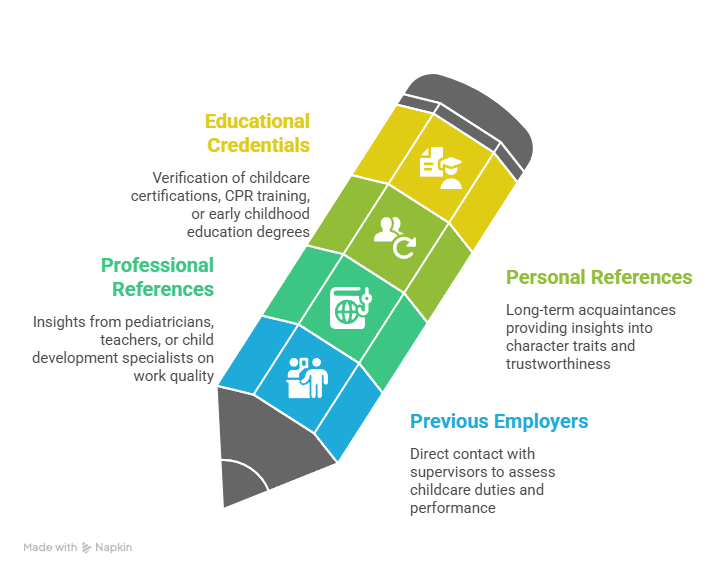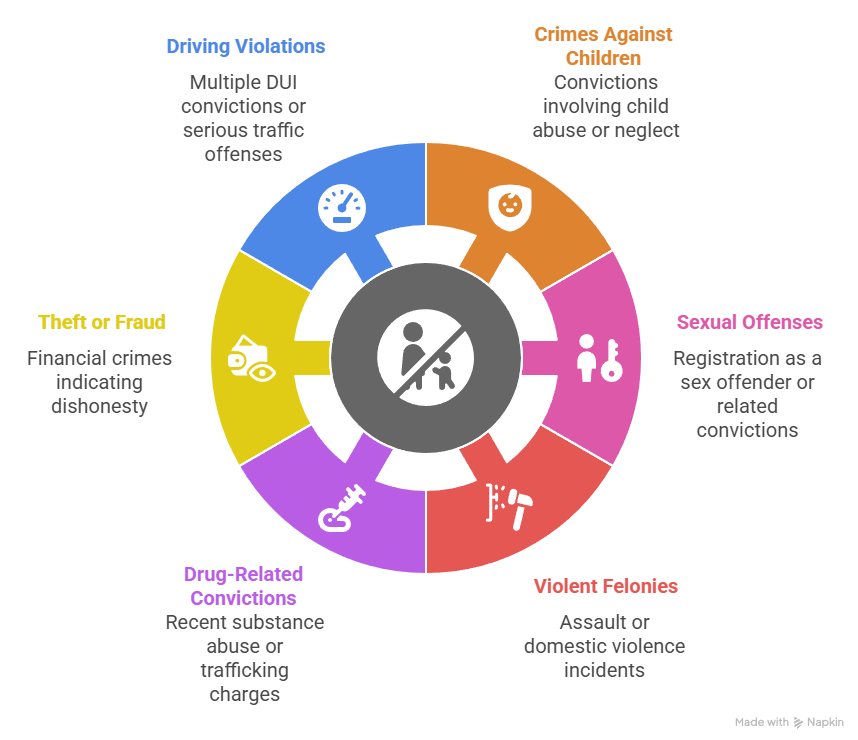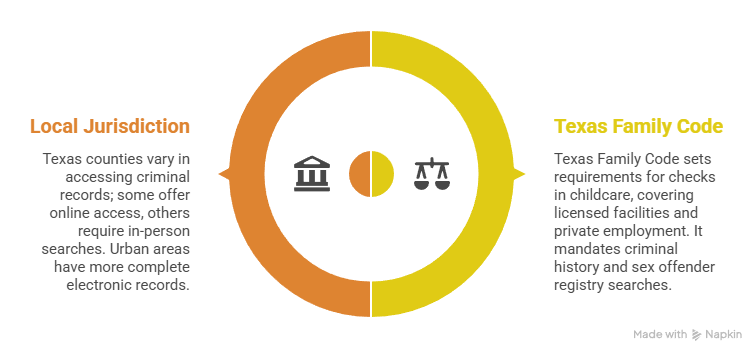Nanny background checks in Texas are essential for ensuring child safety and legal compliance, involving criminal history verification, reference checks, and credential validation. Understanding state-specific requirements and federal regulations helps both employers and caregivers navigate the screening process effectively.
Key Takeaways
- Texas requires comprehensive background screening for nannies, including criminal history, sex offender registry checks, and employment verification to ensure child safety.
- Federal and state laws govern nanny background checks, with FCRA compliance mandatory for employers using third-party screening services.
- Professional nanny background checks typically cost between $25-$150 and include multi-state criminal searches, driving records, and reference verification.
- Employers must provide proper disclosures and obtain written consent before conducting any background screening on potential nanny candidates.
- Certain criminal convictions automatically disqualify nanny applicants in Texas, while others require case-by-case evaluation based on severity and recency.
- Both live-in and part-time nannies should undergo the same level of background screening to maintain consistent safety standards for children.
Understanding Texas Nanny Background Check Requirements
When hiring a nanny in Texas, families must navigate specific legal requirements designed to protect children. The state has established clear guidelines for screening childcare providers who work in private homes. These rules apply whether you hire through an agency or find a nanny independently.
Texas law requires employers to conduct thorough background checks on all nanny candidates. This process includes verifying criminal history, checking sex offender registries, and confirming professional credentials. The requirements exist to ensure that only qualified, trustworthy individuals care for children in residential settings. Moreover, these standards help protect families from potential liability issues that could arise from inadequate screening.
The screening process must also comply with federal regulations, particularly the Fair Credit Reporting Act. Additionally, employers cannot discriminate based on protected characteristics while still maintaining their right to ensure child safety. Understanding both state and federal requirements helps create a hiring process that protects everyone involved while remaining legally compliant.
Essential Components of Nanny Background Screening
Criminal History Verification
Professional background checks examine multiple criminal databases to identify potential red flags. Texas nanny screening includes county, state, and federal criminal records. These records must span the candidate's complete residence history. This comprehensive approach ensures no gaps in coverage across different jurisdictions.
The verification process typically covers several key elements:
| Record Type | Coverage Period |
| Felony Convictions | 7-10 years or lifetime |
| Misdemeanor Offenses | 7 years |
| Pending Charges | Current status |
| Sex Offender Registry | Lifetime registration |
Background check companies use advanced database searches for accuracy. They also employ court record verification to ensure completeness. However, employers should understand that instant online searches may miss recent filings. Similarly, sealed records might not appear in standard database searches.
Reference and Employment Verification
Thorough reference checking validates the candidate's childcare experience and professional conduct. Former employers provide valuable insights into work performance and reliability. They can also share observations about interaction with children that criminal records cannot reveal.
The reference verification process should include several important components:

- Previous Employers: Direct contact with supervisory personnel who observed childcare duties and daily performance
- Professional References: Pediatricians, teachers, or child development specialists who know the candidate's work quality
- Personal References: Long-term acquaintances who can speak to character traits and overall trustworthiness
- Educational Credentials: Verification of childcare certifications, CPR training, or early childhood education degrees
This multi-faceted approach creates a comprehensive profile of the candidate's suitability. Moreover, it provides insights beyond what criminal background checks can offer. Employers should document all reference conversations thoroughly. They must also maintain detailed records for compliance purposes.
Additional Screening Components
Beyond criminal history and references, comprehensive nanny screening includes driving record checks. This component becomes especially important when transportation duties are required. Drug screening may also be requested, depending on family preferences and state regulations.
Social media screening has become increasingly common in nanny background checks. However, employers must be careful to avoid discrimination based on protected characteristics. Professional screening companies can conduct compliant social media reviews that focus on job-relevant behavior patterns.
Legal Compliance for Texas Employers
Fair Credit Reporting Act regulations govern how employers conduct nanny background checks. These rules apply specifically when using third-party screening companies for verification services. Compliance requires specific disclosures and written consent from candidates. Moreover, employers must follow proper adverse action procedures if employment decisions are based on background results. Violations can result in significant legal liability and substantial financial penalties.
Texas employers must also consider state-specific privacy laws during screening. Additionally, they need to follow anti-discrimination statutes throughout the entire process. The Equal Employment Opportunity Commission provides detailed guidance on using criminal history information appropriately. This guidance helps employers make hiring decisions without violating federal civil rights protections. Proper legal compliance protects both employers and job seekers effectively. At the same time, it maintains effective screening standards for child safety.
Background Check Costs and Timeframes
Pricing Structure for Nanny Screening
Professional nanny background check costs vary based on comprehensiveness and turnaround requirements. Basic criminal searches typically start around $25-$50 per candidate. Meanwhile, comprehensive packages including driving records and education verification range from $75-$150. The investment level often correlates with the depth of information provided.
Premium screening services offer additional features that justify higher costs. These enhanced services provide more thorough protection for families:
- Multi-State Criminal Database Access: Comprehensive searches covering all states where candidates have lived or worked previously
- Real-Time Court Record Updates: Access to recently filed cases that may not appear in standard databases yet
- International Background Checks: Specialized screening for candidates with foreign residence or employment history documentation
- Ongoing Monitoring Services: Automated alerts for new criminal activity discovered after the initial hiring decision
Employers should balance cost considerations with appropriate risk management for their family's needs. Investment in thorough screening often prevents more significant problems and expenses later. Therefore, the upfront cost typically provides valuable long-term protection for families.
Processing Timelines and Expectations
Standard nanny background checks typically complete within 2-5 business days for most candidates. However, complex cases involving multiple states may require additional time. International background checks or extensive employment history can extend timelines to 7-14 days. The thoroughness of verification directly impacts processing speed.
Several factors can extend processing time beyond standard expectations. Court record availability varies significantly between jurisdictions and can cause delays. Reference responsiveness also affects timeline completion when former employers are difficult to reach. Additionally, the need for manual verification of credentials can slow the process. Employers should plan hiring timelines accordingly and communicate expected delays clearly to candidates.
Disqualifying Factors and Red Flags
Texas maintains strict standards for childcare provider eligibility based on criminal history. Certain convictions result in automatic disqualification from nanny positions. However, other offenses require individualized assessment considering multiple factors. These factors include offense severity, time elapsed, and evidence of rehabilitation. Understanding these standards helps both employers and candidates navigate the evaluation process effectively.
The following categories typically result in disqualification from nanny positions in Texas:

- Crimes Against Children: Any conviction involving child abuse, neglect, endangerment, or exploitation of minors
- Sexual Offenses: Registration as a sex offender or any convictions for sexual crimes against adults or children
- Violent Felonies: Assault charges, domestic violence incidents, or other crimes involving physical harm to others
- Drug-Related Convictions: Recent substance abuse offenses or trafficking charges that indicate ongoing substance issues
- Theft or Fraud: Financial crimes that indicate trustworthiness concerns or dishonesty in professional relationships
- Driving Violations: Multiple DUI convictions or serious traffic offenses when transportation duties are required for the position
Employers should document their decision-making process thoroughly throughout the evaluation. They should also provide opportunities for candidates to explain circumstances surrounding any issues. Additionally, candidates can provide evidence of rehabilitation or personal growth since the incident. This balanced approach supports legal compliance while maintaining appropriate safety standards for children.
Best Practices for Employers and Job Seekers
Employer Guidelines and Preparation
Successful nanny background check processes require careful preparation and clear communication from employers. First, employers should establish consistent screening criteria before beginning their search. Then, they should communicate requirements transparently to all candidates. This approach ensures fairness and helps candidates prepare appropriately for the screening process.
Creating a comprehensive screening checklist ensures nothing important is overlooked during evaluation. This systematic approach reduces liability risks significantly for families. It also helps identify the most qualified candidates for childcare positions efficiently. Both employers and nannies benefit when expectations and requirements are understood upfront.
Documentation requirements for Texas nanny background checks include several key components:
| Document Type | Employer Responsibility | Candidate Responsibility |
| FCRA Disclosures | Provide required legal notices | Review and acknowledge receipt |
| Consent Forms | Obtain written authorization | Provide accurate personal information |
| Background Reports | Store securely and limit access | Review results for accuracy |
| Decision Documentation | Record hiring rationale | Understand appeal rights |
This structured approach ensures legal compliance throughout the process. Moreover, it creates a professional experience for all parties involved in screening.
Candidate Preparation and Response
Job seekers should prepare documentation and be ready to discuss any issues proactively. Candidates should gather employment history, references, and relevant certifications before applying. Additionally, they should be prepared to explain any background issues honestly and thoroughly.
Transparency often works in favor of qualified candidates with minor background issues. Employers appreciate honesty about past mistakes and evidence of personal growth. Therefore, candidates should prepare clear explanations and documentation of rehabilitation efforts when applicable.
Working with Professional Screening Companies
Selecting Qualified Background Check Providers
Choosing the right background check company significantly impacts the screening process quality. Professional providers should offer comprehensive database access and accurate reporting. They must also maintain strict compliance with federal and state regulations. Additionally, they should provide clear turnaround times and responsive customer support.
Key factors to consider when selecting screening providers include:
- Accreditation Status: Look for companies with proper licensing and industry certifications for background screening services
- Database Coverage: Ensure access to comprehensive criminal databases, employment records, and reference verification capabilities
- Compliance Standards: Verify adherence to FCRA regulations, state privacy laws, and anti-discrimination requirements
- Reporting Quality: Review sample reports for clarity, accuracy, and completeness of information provided to employers
- Customer Support: Evaluate availability of knowledgeable staff to assist with questions or issues during the screening process
Professional screening companies should provide detailed explanations of their processes. They should also offer guidance on legal compliance throughout the hiring process.
Understanding Report Results and Limitations
Background check reports require careful interpretation to make informed hiring decisions. Not all findings automatically disqualify candidates from nanny positions. Therefore, employers need to understand the context and relevance of different types of information.
Common limitations of background check reports include timing delays for recent court filings. Additionally, sealed or expunged records may not appear in standard searches. Geographic limitations can also create gaps in coverage for candidates with extensive travel history. Understanding these limitations helps employers make more informed decisions about additional screening needs.
State-Specific Considerations for Texas

Texas Family Code Requirements
The Texas Family Code establishes specific requirements for background checks in childcare settings. These requirements apply to both licensed facilities and private household employment. The code mandates criminal history checks and sex offender registry searches for all childcare providers. Additionally, it requires verification of any professional licenses or certifications claimed by candidates.
Texas law also addresses the handling of background check information and privacy protections. Employers must store screening results securely and limit access to authorized personnel. Furthermore, they must dispose of screening documents properly when they are no longer needed.
Local Jurisdiction Considerations
Different Texas counties may have varying processes for accessing criminal records. Some jurisdictions provide online access to court records, while others require in-person searches. Therefore, comprehensive background checks must account for these differences in record availability.
Urban areas typically have more complete electronic records than rural counties. However, rural jurisdictions may have longer processing times for record requests. Professional screening companies understand these variations and adjust their processes accordingly.
Ongoing Monitoring and Re-screening
Continuous Background Monitoring
Some employers choose ongoing monitoring services to stay informed about new criminal activity. These services provide alerts when existing employees have new arrests or convictions. Ongoing monitoring can be particularly valuable for long-term employment relationships with nannies.
However, ongoing monitoring requires additional consent from employees and specific legal disclosures. Employers must follow proper procedures for any adverse actions based on monitoring results. Additionally, they should establish clear policies about how new information will be evaluated.
Periodic Re-screening Requirements
Many families implement periodic re-screening policies for long-term nanny employment. Annual or bi-annual background checks help ensure continued eligibility for childcare positions. This practice is especially common for live-in nannies with extensive access to family property and children.
Re-screening policies should be clearly communicated during initial hiring and documented in employment agreements. Employers should also consider the costs and administrative burden of regular re-screening when establishing these policies.
Special Circumstances and Considerations
International Candidates and Documentation
Nanny candidates with international backgrounds require specialized screening approaches. Criminal background checks in foreign countries often involve different processes and documentation. Therefore, employers may need to work with specialized screening companies for international verification.
Immigration status verification is also required for all nanny candidates in Texas. Employers must complete Form I-9 documentation and verify work authorization. Additionally, they should understand the relationship between immigration status and background check requirements.
Handling Background Check Disputes
Occasionally, candidates may dispute information found in their background check reports. Employers should understand the dispute process and provide reasonable time for resolution. The Fair Credit Reporting Act provides specific rights for candidates to challenge inaccurate information.
During dispute resolution, employers should avoid making final hiring decisions based on disputed information. Instead, they should wait for the dispute process to conclude before proceeding. This approach protects both employers and candidates from legal complications.
Conclusion
Texas nanny background checks serve as crucial safeguards for families seeking qualified childcare providers. Meanwhile, they ensure legal compliance for employers throughout the hiring process. The comprehensive screening process includes criminal history verification, reference checks, and credential validation effectively. These components create a foundation of trust between families and caregivers that benefits everyone involved. Understanding state-specific requirements, federal regulations, and best practices helps both employers and job seekers navigate this important process successfully. Therefore, investing in thorough background screening ultimately protects children while supporting qualified caregivers and providing peace of mind for families throughout Texas.
Frequently Asked Questions
How long do Texas nanny background checks take to complete?
Most Texas nanny background checks complete within 2-5 business days for standard cases. Complex situations involving multiple states, international history, or extensive employment verification may require 7-14 days. Employers should plan hiring timelines accordingly and communicate expected timeframes to candidates.
What disqualifies someone from working as a nanny in Texas?
Automatic disqualifiers include crimes against children, sex offender registration, violent felonies, and recent drug convictions. Other factors like theft, fraud, or driving violations are evaluated case-by-case considering severity, recency, and rehabilitation evidence.
Do employers need consent to run background checks on nanny candidates?
Yes, Texas employers must obtain written consent before conducting background checks when using third-party screening companies. FCRA compliance requires proper disclosures and authorization forms before accessing consumer reports for employment decisions.
How much do professional nanny background checks cost in Texas?
Basic criminal searches cost $25-$50, while comprehensive packages including driving records, education verification, and reference checks range from $75-$150. Premium services with multi-state searches and ongoing monitoring may cost more but provide enhanced protection.
Are live-in nannies subject to different background check requirements?
No, both live-in and part-time nannies should undergo the same comprehensive background screening in Texas. The level of access to children and family property requires consistent safety standards regardless of employment arrangement or schedule.
Can nanny candidates with criminal records still be hired in Texas?
It depends on the specific offense, timing, and circumstances. While certain crimes result in automatic disqualification, many employers consider rehabilitation, job relevance, and time elapsed when making hiring decisions within legal guidelines.
What happens if errors appear on a nanny background check report?
Candidates have the right to dispute inaccurate information with the background check company and reporting agencies. Employers should provide copies of reports and allow reasonable time for corrections before making final hiring decisions based on disputed information.
Do Texas nannies need special licenses or certifications for background checks?
Texas doesn't require special licenses for private nannies, but many employers prefer candidates with CPR certification, first aid training, or early childhood education credentials. These qualifications are often verified as part of the background screening process.
Additional Resources
- Fair Credit Reporting Act Compliance Guide for Employers
https://www.ftc.gov/business-guidance/resources/using-consumer-reports-what-employers-need-know - Texas Department of Family and Protective Services Background Check Information
https://www.dfps.state.tx.us/background_checks/ - Equal Employment Opportunity Commission Criminal Records Guidance
https://www.eeoc.gov/laws/guidance/consideration-arrest-and-conviction-records-employment-decisions-under-title-vii - National Association for the Education of Young Children Screening Guidelines
https://www.naeyc.org/our-work/families/background-screening - Texas Workforce Commission Employment Law Resources
https://www.twc.texas.gov/partners/employer-resources - Consumer Financial Protection Bureau FCRA Information for Employers
https://www.consumerfinance.gov/compliance/compliance-resources/other-applicable-requirements/fair-credit-reporting-act/
Still have questions?
Get in touch with our team today for a personalized demo and discover how our tailored volume pricing and packages can drive results for your business!
How useful was this page?*
Note: your comments are anonymous. We use them to improve the website. Do not include any personal details.
Visit our FCRA Compliance Tool or leave a message here if you need a response.
From the blog Explore the GCheck Content Hub

How Long Does a Background Check Take? A Complete 2025 Guide
13 Dec, 2023 • 14 min read
The Ultimate Background Check Guide
13 Dec, 2023 • 4 min read
The Ultimate Guide to Employment Background Checks
13 Dec, 2023 • 10 min readThe information provided in this article is for general informational and educational purposes only and should not be construed as legal advice or a substitute for consultation with qualified legal counsel. While we strive to ensure accuracy, employment screening laws and regulations—including but not limited to the Fair Credit Reporting Act (FCRA), Equal Employment Opportunity Commission (EEOC) guidelines, state and local ban-the-box laws, industry-specific requirements, and other applicable federal, state, and local statutes—are subject to frequent changes, varying interpretations, and jurisdiction-specific applications that may affect their implementation in your organization. Employers and screening decision-makers are solely responsible for ensuring their background check policies, procedures, and practices comply with all applicable laws and regulations relevant to their specific industry, location, and circumstances. We strongly recommend consulting with qualified employment law attorneys and compliance professionals before making hiring, tenant screening, or other decisions based on background check information.

